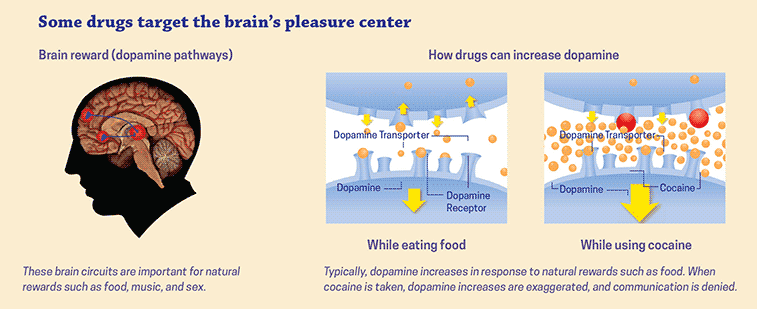Stimulants are drugs that have the power to alter the way the mind works. They have been used for centuries to treat medical conditions, but their effects on the brain are complex and not fully understood. In this article, we will explore how stimulants affect the mind and what their potential uses and dangers are. We will also discuss the implications of their use for mental and physical health. So, if you’re curious about how stimulants change the way the mind works, keep reading!

Contents
What are Stimulants?
Stimulants are substances that increase alertness, focus, energy, and motivation. They are usually taken by mouth, injected, or inhaled. Common stimulants include caffeine, nicotine, and amphetamines. Stimulants can be beneficial when used safely, but they can also be dangerous when abused.
Stimulants Increase Attention
Stimulants increase attention by increasing the firing rate of neurons in the brain. This allows the user to focus more on tasks and block out distractions. It also improves reaction time and decision-making. The increased attention can be beneficial when studying or working on a task, but it can be dangerous when driving or operating machinery.
Stimulants Increase Energy
Stimulants also increase energy levels by increasing the production of the neurotransmitter dopamine. This increases feelings of pleasure and motivation. The increased energy can be beneficial when exercising or completing a task, but it can be dangerous when engaging in risky behaviors.
Stimulants Affect Mood
Stimulants affect mood by increasing the production of the neurotransmitter serotonin. This increases feelings of happiness and wellbeing. The increased mood can be beneficial for those suffering from depression or anxiety, but it can be dangerous when taken in high doses.
Stimulants Affect Appetite
Stimulants can also affect appetite. Stimulants can reduce hunger by decreasing the production of the hormone ghrelin, which is responsible for hunger. This can be beneficial for those trying to lose weight, but it can be dangerous when taken in high doses.
Stimulants Affect Sleep
Stimulants also affect sleep by increasing the production of the hormone cortisol. This increases alertness and reduces the amount of sleep needed. The increased alertness can be beneficial when studying or working on a task, but it can be dangerous when driving or operating machinery.
Stimulants Have Side Effects
Stimulants have a range of side effects, including anxiety, insomnia, dizziness, and nausea. They can also increase the risk of addiction and heart problems. It is important to talk to a doctor before taking any stimulant, as some may interact with other medications.
Stimulants Can Be Abused
Stimulants can be abused, which can lead to serious health problems. Stimulant abuse can cause increased heart rate and blood pressure, increased risk of stroke, and decreased appetite. It can also lead to addiction and an increased risk of depression and anxiety.
Stimulants Should Be Used Safely
Stimulants should be used safely and responsibly. It is important to talk to a doctor before taking any stimulant, as some may interact with other medications. It is also important to avoid taking stimulants in high doses or for prolonged periods of time.
Frequently Asked Questions
What Are Stimulants?
Stimulants are drugs or substances that increase alertness, energy, and attention. Stimulants work by increasing the availability of neurotransmitters such as dopamine, norepinephrine, and serotonin in the brain. Examples of stimulants include caffeine, cocaine, nicotine, and prescription drugs like Adderall and Ritalin. Stimulants can be used therapeutically to treat attention-deficit hyperactivity disorder (ADHD) and narcolepsy, or they can be abused recreationally.
How Do Stimulants Work?
Stimulants work by increasing the availability of certain neurotransmitters in the brain. These neurotransmitters are responsible for regulating mood, attention, and energy levels. When stimulants are taken, they increase the amount of dopamine, norepinephrine, and serotonin in the brain, resulting in feelings of alertness, energy, and mental clarity. Stimulants also increase heart rate, respiration, and blood pressure.
What Are the Effects of Stimulants on the Mind?
The effects of stimulants on the mind vary depending on the type and amount of stimulant taken. Generally, stimulants have a positive effect on the mind, improving alertness, focus, and concentration. Stimulants can also improve mood and reduce fatigue, making it easier to stay awake and alert. In larger doses, stimulants can cause euphoria, anxiety, and paranoia.
Are There Risks Associated with Taking Stimulants?
Yes, there are risks associated with taking stimulants. Stimulants can be addictive and can lead to physical and psychological dependence if abused. Stimulants can also interact with other drugs, increasing the risk of overdose. Other potential risks include increased heart rate, increased blood pressure, and decreased appetite.
What Are Stimulant Abuse Disorders?
Stimulant abuse disorders are psychiatric disorders characterized by the recurrent use of stimulants despite negative consequences. Stimulant abuse disorders can include physical dependence, psychological dependence, and compulsive use. Stimulant abuse disorders can lead to serious health problems and even death.
How Can Stimulant Abuse Be Treated?
The treatment of stimulant abuse typically involves a combination of medications and psychotherapy. Common medications used to treat stimulant abuse are antidepressants, antipsychotics, and mood stabilizers. Psychotherapy can include cognitive-behavioral therapy, interpersonal therapy, and other forms of psychosocial interventions. Treatment for stimulant abuse should be tailored to the individual’s specific needs and should be supervised by a medical professional.
2-Minute Neuroscience: Amphetamine
In conclusion, stimulants are powerful drugs that can have both positive and negative impacts on the mind. They can help to improve focus, alertness and concentration, but can also lead to addiction, anxiety and insomnia. Understanding the effects of stimulants on the mind is essential for a successful and balanced approach to their use. With the right guidance and caution, stimulants can be a beneficial tool to aid productivity and performance.

